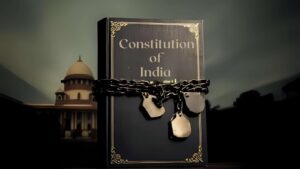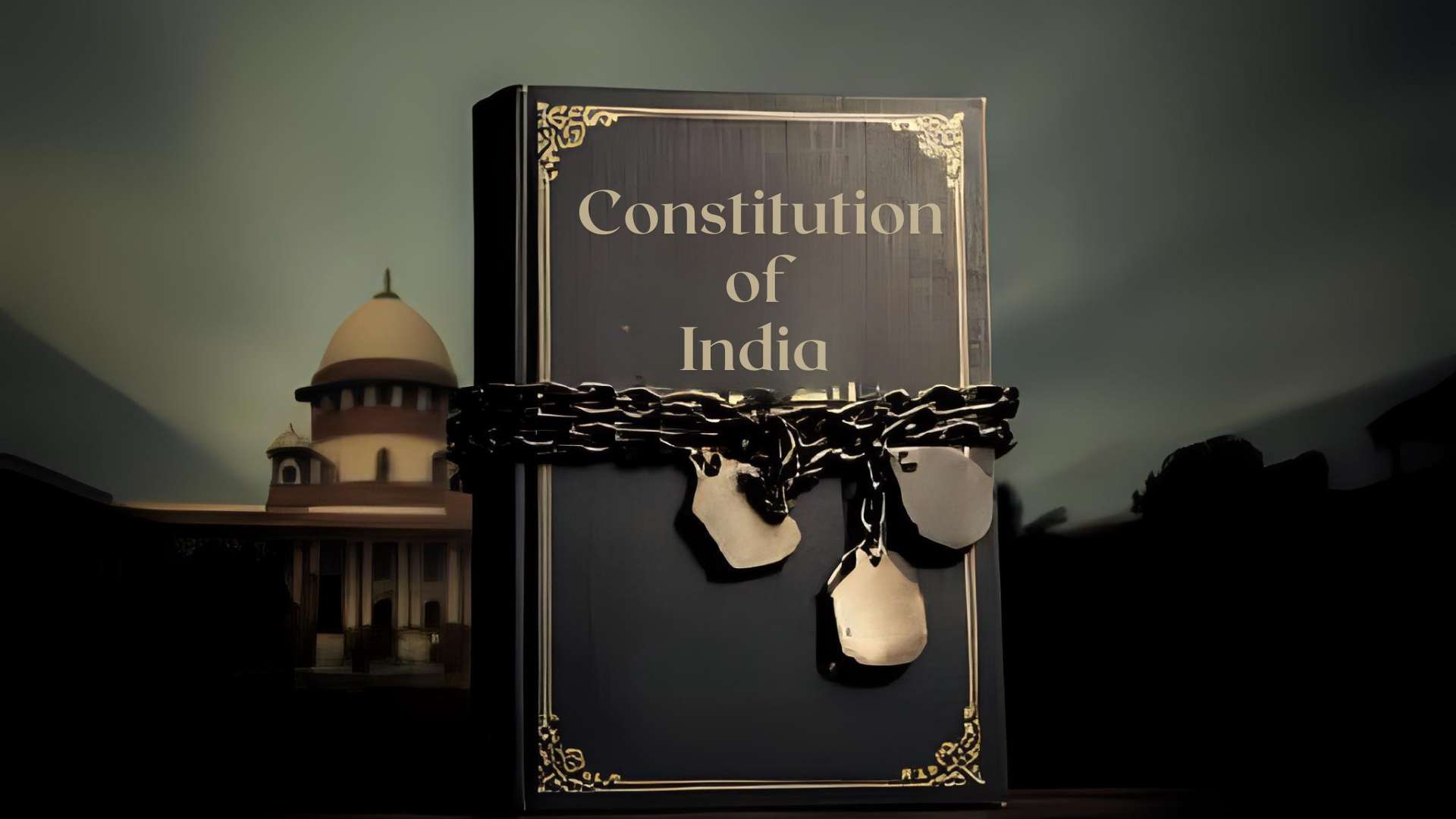 In the recently published book (In) Complete Justice? The Supreme Court at 75, Critical reflections edited by Justice S. Muralidhar, former Chief Justice, Odisha, Dr. Usha Ramanathan, in her article, has quoted many cases where the Courts have delayed justice, which is actually denial of justice.
In the recently published book (In) Complete Justice? The Supreme Court at 75, Critical reflections edited by Justice S. Muralidhar, former Chief Justice, Odisha, Dr. Usha Ramanathan, in her article, has quoted many cases where the Courts have delayed justice, which is actually denial of justice.
In 1923 itself, the Civil Justice Committee was set up to enquire into ways to provide for more speedy, economical, and satisfactory despatch of matters transacted in courts and the execution. More than 100 years have passed.
It is unfortunate that it is the Union Government which has mastered the art of delaying, denying, and trivialising justice.
“The significance of delay in deciding the matters that have an immediate and far-reaching bearing on democracy, liberty, citizenship, the making of laws, the Government’s expanding power, and shrinking fundamental rights of the people has provoked public comment and raised public anxiety about the part the Court may play in restraining State power”, says Dr. Usha Ramanathan.
The six fundamental rights are:
Right to Equality (Articles 14–18):
Guarantees equality before the law and prohibits discrimination based on religion, race, caste, sex, or place of birth.
Right to Freedom (Articles 19–22):
Protects certain freedoms such as freedom of speech and expression, assembly, association, movement, and residence, as well as protection in respect of conviction for offences.
Right Against Exploitation (Articles 23–24):
Prohibits human trafficking, forced labour, and child labour.
Right to Freedom of Religion (Articles 25–28):
Ensures the freedom of conscience and the right to practice, profess, and propagate any religion, along with managing religious affairs.
Cultural and Educational Rights (Articles 29–30):
Protects the interests of minorities by giving them the right to establish and administer their own educational institutions.
Right to Constitutional Remedies (Article 32):
Grants citizens the right to approach the Supreme Court or High Courts for the enforcement of these fundamental rights.
The right to constitutional remedies is taken away by the delays in courts.
Dr. Usha has highlighted a few cases under the heads Electoral Bonds and Democracy, Pegasus and Surveillance, Equal Citizenship, Money Bills, States of Exception and Civil Liberty, Liberty and Pragmatism, Plea Bargaining, Jail Adalat, and Bhopal Industrial Disaster – The Tragedy of Bhopal. Some of these cases are still pending in different courts.
She concludes, “These are but fragments from judicial records and current affairs, yet these anecdotes represent a disturbing relationship between people, the court, and the Constitution. Foregrounding fundamental rights over judicial pragmatism could possibly be the necessary first step to getting out of the situation in which the system is mired.”
Now look at WP(C) 9749 of 2017 filed by All India Bank Officers Confederation in 2017 and still continuing at the Delhi High Court. (You can refer to the Delhi High Court -case status.)
Passing of Nationalisation Act
On 19th July 1969, through an Ordinance 14 banks were nationalised. While introducing a bill in the Parliament Mrs. Indira Gandhi said in her speech the purpose. They were
Accelerating economic development
- She argued that the move was essential for “problems of growth with stability and social justice”.
- The government intended to accelerate development and make a significant impact on poverty and unemployment.
Ending the control of a few business houses
- Before 1969, private banks were primarily controlled by wealthy industrialists and directed credit toward their own business interests, ignoring other important sectors.
- Gandhi aimed to remove this concentration of wealth and power from a few private players.
Directing credit to priority sectors
- Nationalization was intended to reorient credit deployment away from big businesses and toward priority sectors like agriculture, small-scale industries, and exports.
- This aimed to fund the Green Revolution and encourage new entrepreneurs.
Expanding banking access to rural areas
- To ensure the benefits of economic development reached the entire population, nationalization was a strategy to expand the banking network, especially into rural and semi-urban areas.
- This was intended to mobilize savings and draw more people into the formal banking system.
Building public confidence in the banking system
- The failures of hundreds of private banks in the decades after independence had eroded public confidence and led to losses for depositors.
- Nationalization aimed to stabilize the financial system and restore trust by placing banks under state ownership.
Mr. Madulimayee suggested workers participation in Management which was readily accepted and implemented.
Till 2014, different governments have strictly followed the law and appointed Workmen Directors and Non-Workmen Directors. In fact, six months before the expiry of the term of one, the banks used to ask for names from Unions and Associations and ensured that there was no vacuum. But after 2014, there has not been a single appointment of these directors. After exhausting all methods of appeals, AIBOC filed the case in 2017. Initially, the Government pleaded for dismissal of the petition, which was turned down by the Honourable Court.
The Department of Financial Services was directed to follow the law and complete the appointments. But the Government has mastered the art of delaying. They will keep the file pending till one of the persons recommended among the three attains the age of 57 and does not have residual service of three years. Then they will ask for fresh names.
Though the rules say that the MD of the Bank will appoint a GM to verify the membership of the Association to ascertain the majority Union/Association, the DFS was sending approval letters for GMs to verify membership, just to delay the process. This itself is a joke now because every Union/Association has a check-off facility for collecting membership fees, and the Banks know on every salary day how many members are in different Unions/Associations.
The recommendation process itself is tedious. The Bank has to get three names from the majority Union/Association in order of priority. Each one should have three years of residual service. The Banks have to ascertain and confirm that there is no vigilance case pending against the three, no major punishment given, and their Annual Confidential Report for three years should be positive.
In some cases, the DFS rejected names on the grounds of disciplinary cases though no punishment was given. Then they enquire with the CBI to confirm that there is no case pending. Then the names are sent to the RBI, which can take its sweet time. After that, the names are sent to the Appointments Committee of the Cabinet, which has just two persons , the Prime Minister and the Home Minister.
Once, this ACC rejected all recommendations without stating any reason. This was objected to by Mr. Prashant Bhushan, the Senior Counsel for AIBOC. DFS again asked for fresh names. The status of recommendations as on 19.08.2025 is given below.
For more than a year, the ACC has not found time to approve proposals sent after completing all formalities and after getting RBI Clearances. This has affected the objectives of Nationalisation. Reversals are taking place without the presence of Workmen and Non Workmen directors who could object.
Now DFS has come up with another statement. It says, “The Department is actively considering a comprehensive overhaul of the governance framework of Public Sector Banks. As a part of this initiative, certain modifications to the procedure and provisions concerning the appointment or nomination of all Directors to the Boards of Public Sector Banks are currently under review. Future appointments and nominations of Directors to the Boards are proposed to be carried out in accordance with the proposed revised procedures. Consequently, finalising these appointments may necessitate additional time as it involves inter-ministerial consultations, cabinet approval, and legislative consent.”
When the Honourable Court is asking to implement the existing law, which was followed meticulously from 1970 to 2014 with the rules formed by the Government, this Government is saying it is going to go for a new law.
Can they do it without implementing the existing law? After eight years of excuses, they are saying this. Can the Court keep its eyes closed to the murder of the Court’s directions?
What are they afraid?
They are afraid that the favours given to their closest businessmen in the form of loans at concessional rates, violation of credit appraisal norms, huge write offs and frauds may come out.
What is the loss for the country? In this period, Rs. 16.5 lakh crores of people’s money have been written off in loans given to corporates and big business. The branches and staff of Public Sector Banks have been reduced, forcing the farmers, traders, micro and small enterprises, women, and students to go to the microfinance institutions, which charge heavy interest, penalties, and cruelty in recovery, leading to suicides, as deposed in the public hearing conducted by the All India Democratic Women’s Association and various study reports.
The income inequality which had come down is going up steadily. The oligarchs are growing with bank support, and the common men and women get low-interest savings and loans at high rates of interest. This is against the Constitution. Just to help a few cronies, the PM and HM are preventing the appointment of Workmen and Non-Workmen Directors who function as watchdogs within the Boards of Public Sector Banks.
Loans are given without proper assessment, leading to write-offs. Write-offs are done without any iota of transparency. The small depositors are given very low interest on deposits. They don’t bother that without this deposits banks will have to close down.
Privatisation
The Government is also afraid that they cannot get privatisation approved in boards without dissent notes.
Conclusion
People are watching. If justice is delayed, it is denied and killed, as the common men and women, we, the people who gave the Constitution, are being punished.
Thomas Franco is the former General Secretary of the All India Bank Officers’ Confederation and a Steering Committee Member at the Global Labour University.
Centre for Financial Accountability is now on Telegram and WhatsApp. Click here to join our Telegram channel and click here to join our WhatsApp channeland stay tuned to the latest updates and insights on the economy and finance.

